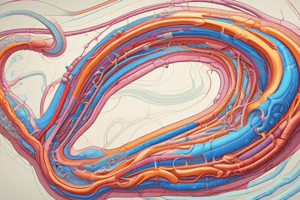Podcast
Questions and Answers
The greatest percentage of the body’s water is found in which of the following?
The greatest percentage of the body’s water is found in which of the following?
- the interstitial fluid
- the blood plasma
- the extracellular fluid
- the intracellular fluid (correct)
Hypertension is likely to increase the secretion of which hormone?
Hypertension is likely to increase the secretion of which hormone?
- atrial natriuretic peptide (correct)
- bicarbonate ions
- aldosterone
- antidiuretic hormone
Which hormone increases water reabsorption without sodium reabsorption?
Which hormone increases water reabsorption without sodium reabsorption?
- Parathyroid hormone
- Antidiuretic hormone (correct)
- Atrial natriuretic peptide
- Aldosterone
Hypotonic hydration can result from which condition?
Hypotonic hydration can result from which condition?
Which structure does urine leave the bladder through?
Which structure does urine leave the bladder through?
Which statement regarding urine formation is correct?
Which statement regarding urine formation is correct?
Blood is brought to the glomerulus by which structure?
Blood is brought to the glomerulus by which structure?
Filtrate enters Bowman’s capsule through which process?
Filtrate enters Bowman’s capsule through which process?
Flashcards
Fluid Compartments
Fluid Compartments
The body's water is distributed into different compartments: intracellular fluid (inside cells), interstitial fluid (between cells), and blood plasma (in blood vessels).
Hypertension & Hormone Secretion
Hypertension & Hormone Secretion
High blood pressure (hypertension) triggers the body to increase the secretion of hormones that help regulate blood pressure, such as antidiuretic hormone (ADH) and aldosterone.
ADH and Water Reabsorption
ADH and Water Reabsorption
Antidiuretic hormone (ADH) increases the reabsorption of water in the collecting ducts of the kidneys, without significantly affecting sodium reabsorption.
Hypotonic Hydration Cause
Hypotonic Hydration Cause
Signup and view all the flashcards
Urine Formation Components
Urine Formation Components
Signup and view all the flashcards
Urine Excretion Path
Urine Excretion Path
Signup and view all the flashcards
Kidney Filtration Process
Kidney Filtration Process
Signup and view all the flashcards
Filtration in Bowman's Capsule
Filtration in Bowman's Capsule
Signup and view all the flashcards
Study Notes
I - Choose the correct answer
- Question 1: The greatest percentage of body water is in the extracellular fluid.
- Question 2: Hypertension increases the secretion of atrial natriuretic peptide.
- Question 3: Antidiuretic hormone increases water reabsorption without sodium reabsorption.
- Question 4: ADH hyposecretion can result in hypotonic hydration.
- Question 5: Reabsorption occurs in all structures of the nephron. The capillary hydrostatic pressure during filtration is greater than the osmotic pressure of the blood. Urine is 96% water.
- Question 6: Urine leaves the bladder through the urethra.
- Question 7: Urine formation involves filtration under the force of four pressures. Normal urine does not contain glucose. Normal filtrate contains few proteins.
II - True or False
- 1. Reabsorption of water in the descending loop of Henle is by passive transport (not active transport).
- 2. ADH activates reabsorption of water in the collecting duct (True).
- 3. The urethra collects urine from the kidneys and empties into the bladder (False, Ureters carry urine from the kidneys to the bladder)
- 4. Plasma protein levels in the glomerulus and Bowman's capsule are unequal after filtration.
- 5. Aldosterone promotes sodium and water retention, which increases blood pressure. (True)
III - Complete the Sentences
- 1. Metabolic water is water produced from chemical reactions.
- 2. The skin loses water through sweating and transpiration.
- 3. Edema is any abnormal fluid accumulation in a part of the body.
Studying That Suits You
Use AI to generate personalized quizzes and flashcards to suit your learning preferences.




